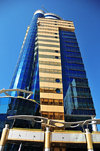 'Eid'
means recurring happiness or festivity. Eid is celebrated with much enthusiasm
and fervor and Muslims from all strata of life can be seen adorned in beautiful
new clothes, visiting the mosques to attend Salatul Eid (Eid prayers).
Greetings of "Eid-Mubarak" or "a blessed Eid" are exchanged.
'Eid'
means recurring happiness or festivity. Eid is celebrated with much enthusiasm
and fervor and Muslims from all strata of life can be seen adorned in beautiful
new clothes, visiting the mosques to attend Salatul Eid (Eid prayers).
Greetings of "Eid-Mubarak" or "a blessed Eid" are exchanged.
A very important aspect of Eid is the charity which all the Muslims are expected to extend to the needy. Earlier, this was in the form of gifts in kind but now cash is given to the needy.
The first Eid of the year, is known as "Eid Al Fitr". Al Fitr literally means breaking of fast. Thus Eid Al Fitr is celebrated on the first day of Shawaal, the tenth month in the Muslim calendar, to mark the end of a month long fast during the month of Ramadan.
It is believed that the Koran was revealed during this month. Coming with the full moon, Eid Al Fitr is a day of joy and thanksgiving. On this day, Muslims show their joy for the health, strength and opportunities of life, which Allah has given them to fulfill their obligations of fasting and other good deeds during the month of Ramadan. It is considered unholy to fast on this day.
It is also a day of forgetting old grudges and ill feelings towards other fellow men. The second most important Eid celebration is called "Eid Al-Adha".
The first Eid was celebrated in 624 CE by the prophet Muhammad with his friends and relatives after the victory of the Battle of Badr.
A special Eid prayer that is performed in congregation at mosques or open areas. Before the prayer the congregation recites the Takbir:
Allahu akbaru, Allahu
akbaru
la illaha ila Allah,
wa Allahu akbar, Allahu
akbaru
wa lillah hilhamd
God is Greatest, God
is Greatest
There is no deity but
[the One] God
God is Greatest, God
is Greatest
and to Him goes all
praise
The Takbir is recited after confirmation that the moon of Shawwal is sighted on the eve of the last day of Ramadan. It continues until the start of the Eid prayer.
Before the Eid prayer begins every Muslim (man, women or child) must pay Zakat al Fitr, an alms for the month of Ramadan. This equates to about 2 kg of a basic foodstuff (wheat, barley, dates, raisins, etc.), or its cash equivalent, and is (typically) collected at the mosque. This is distributed by the mosque to needy local Muslims prior to the start of the Eid prayer. It can be given anytime during the month of Ramadan and is often given early, so the recipient can utilise it for Eid purchases. This is distinct to Zakat based on their wealth which must be paid to a worthy charity. This is calculated at 2.5% of their wealth.
The Eid prayer (salah) is followed by the khutba (sermon) and then a prayer (dua') asking for forgiveness, mercy and help for the plight of Muslims across the world. It is then customary to embrace the persons sitting on either side of you as well as your relatives, friends and acquaintances.